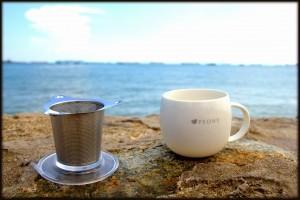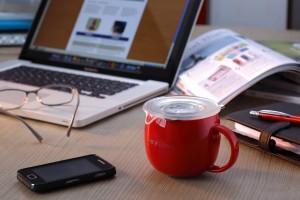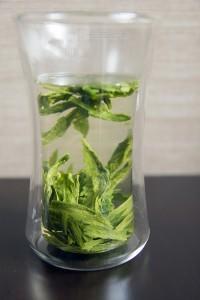Sometimes it’s the small things that create the biggest impact, especially if it’s sustained over a prolonged period.
We often advocate consuming tea everywhere, especially in the office since that is where the average working adult spends the majority of his or her working hours. Not always a pleasing fact but a fact nonetheless.
Let us calculate the impact of substituting tea into our beverage consumption during the course of a typical workday.
Commonly Consumed Drinks throughout the Day
In this illustration, we will look at the needs of a typical office worker.
In the morning, he or she will need a stimulant to shake off the cobwebs. Very often, he or she will make a packet of instant coffee for that purpose.
Around lunch time or break time, very often there is a craving for something sweet; something tasty and savory, if nothing else as an indulgence to dispel the monotony of the work day. One of the choices could be a soft drink, or any sugared drinks including ice blended coffee drinks or bubble teas. Common traits of these teas are that they tend to be sweet and refreshing, as you would need to combat the lethargic feeling.
Then in the afternoon, especially after a heavy lunch, lethargy starts to set it. To accentuate the woes, one may be summoned for a long meeting to perpetuate the appearance of productivity. Not the best combination for keeping one’s faculties. A stimulant is needed for that purpose, sometimes if the meeting chair is nice, he or she will send someone out for coffee or tea. Most times, it’s best to come prepared.
“If you are cold, tea will warm you; if you are too heated, it will cool you; if you are depressed, it will cheer you; if you are excited, it will calm you.”
William E. Gladstone
The Versatility of Tea

For the purposes or goals sought by the typical office worker in our illustration, tea is a more than capable substitute.
When we need a stimulant, tea can provide an excellent alternative. It contains caffeine- which in moderation is an excellent stimulant- which would provide a nice boost for the day.
In traditional Chinese wisdom, one of the 20 quoted benefits of tea is that it heightens awareness and wakes the brain (提神醒脑). Doesn’t sound like a bad thing for meeting the challenges of the day.
“Tea tempers the spirit and harmonizes the mind; dispels lassitude and relieves fatigue, awakens thought and prevents drowsiness”
Lu Yu “the Sage of Tea
Certain types of teas- especially green tea and lightly oxidized oolong teas are sweet and brisk. It has a refreshing taste that can break the depressive spirit that often sets in after hours of strive.
As for the afternoon stimulant, caffeine plays a role as does the digestive aid that tea is. Much of the afternoon fatigue is caused by the diversion of blood and hence oxygen supply to the digestive tract to break down the carbohydrate intake.
Tea has been used to aid digestion and settle the stomach for a long time and its effect in dispelling the fatigue is two-pronged.
The Weight Loss Impact
Before the reader gets carried away, let us be clear- tea is not a miracle weight-loss product (see here for more details)- there are no short cuts. But as anyone who has researched on weight-loss, the basic principle is this: weight loss takes place when there is a caloric deficit- i.e. calories consumed is less than calories expended.
Hence every weight loss program is based on 1 of 2 things (or both): increasing calories expended and reducing calories consumed.
Let’s look at our illustration again.
A cup of coffee contains about 65 calories (source)

Hence, in our example, our typical office worker would consume:
65 x 2 + 140= 270 calories per day
Substituting 3 cups of tea for it, he or she consumes about 3 calories per day instead (source)
Note: This is based on a pure tea or tea that has not been adulterated with additives or blended with foreign substances, consumed without milk and sugar.
In the illustration I would use a green tea for reasons to be elaborated later but essentially all pure teas that are consumed without milk or sugar would have substantially nil calories.
The net reduction in calorie intake is 270 – 3 = 267 calories per day.
The impact of this would be about 0.5 lbs per week in fat loss (source), all else being equal.
Not a sexy reduction that would help you look good for the upcoming wedding or reunion but this is a small, sustainable reduction that you can incorporate in your daily life.
That in my opinion is more valuable than a faddish diet that you would abandon a week later.
The Financial Impact
The beauty of tea is that besides being a healthful epicurean delight, it is affordable as well. While specialty loose leaf tea does cost more than supermarket teas, it can also be infused multiple times.
Using the same illustration- a typical sized coffee mug of 250 ml would require a sachet of circa 40g which based on a mystery brand (mid-tier) cost $6.90 for 15 packets at a local supermarket.

A can of soft drink cost about $1.20 at the coffee shop.
Hence the office worker in our illustration would spend
$0.46 x 2 + $1.20= $2.12
Using Xinyang Maojian as an example, if you are brewing it using the Rainbow Mug- an infuser mug which is ideal for use in the office- you would probably use about 5 g, filling the mug to 70% or circa 250 ml
Based on the retail price at time of writing- $20.50 per 50 g, this works out to $2.05 per cup.
Each serving of Xinyang Maojian may be steeped a total of 3 times, hence in the illustration, if the office worker substitutes a cup of Xinyang Maojian steeped 3 times for 2 servings of coffee and 1 can of soft drink, he or she will spend approximately the same amount on tea as he or she originally would on drinks, or more precisely, a daily savings of $0.07.
Seems like pretty compelling reasons to enjoy tea in the office.
See more articles on enjoying tea in the office.
